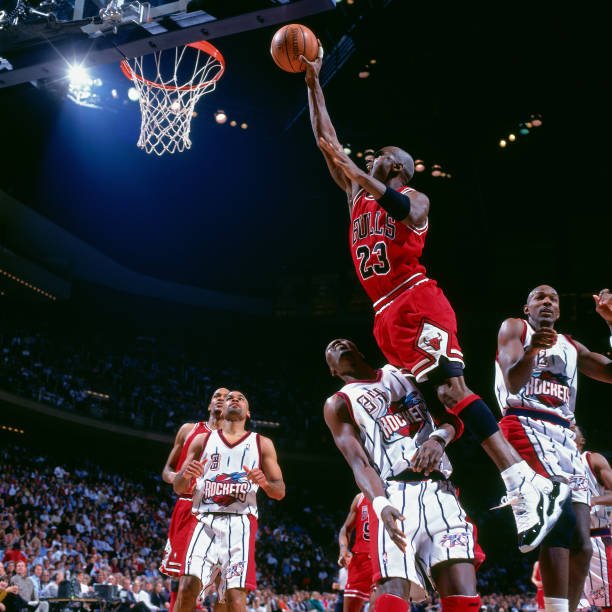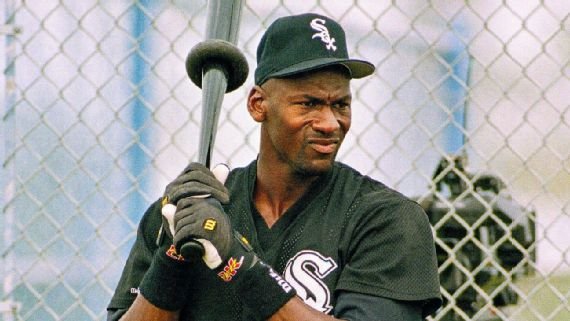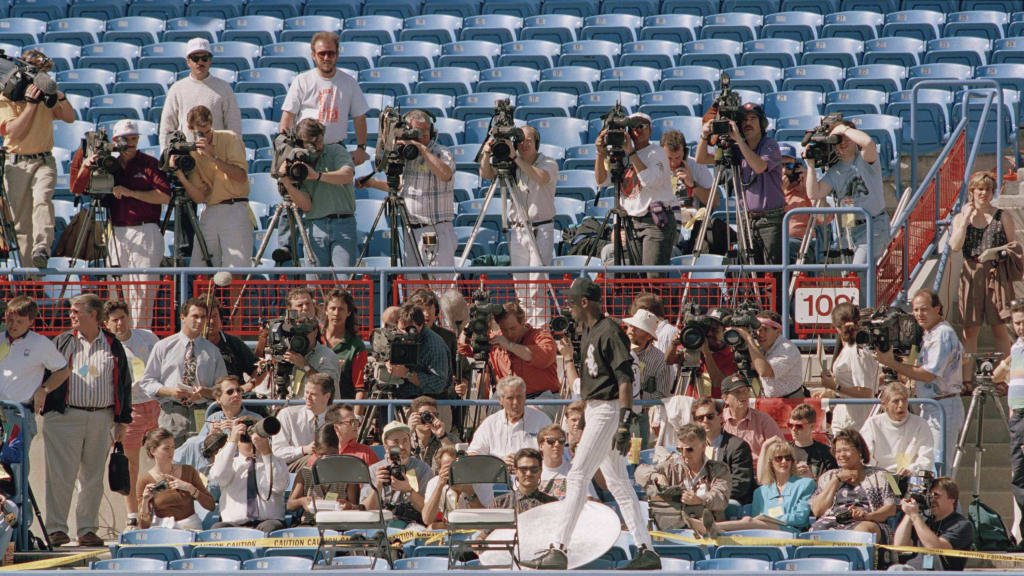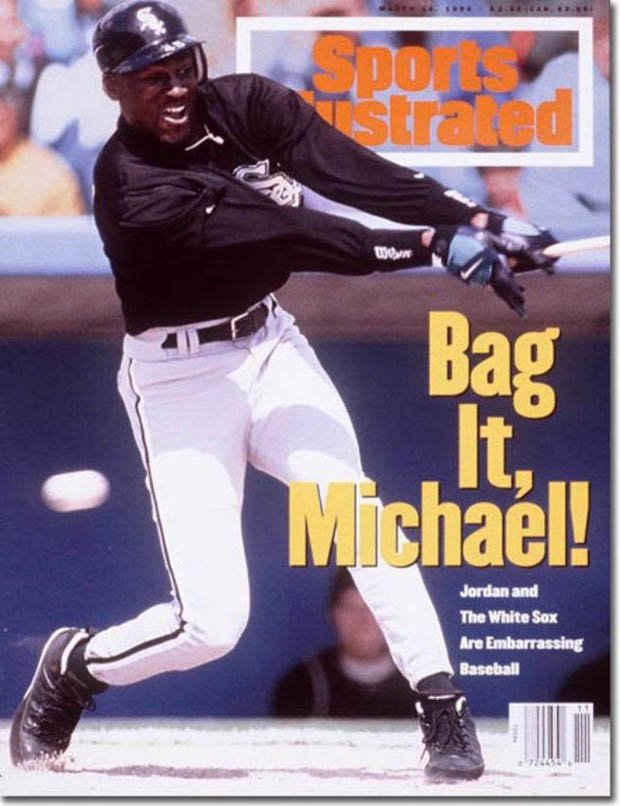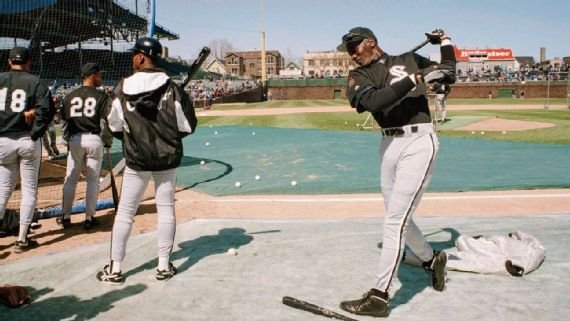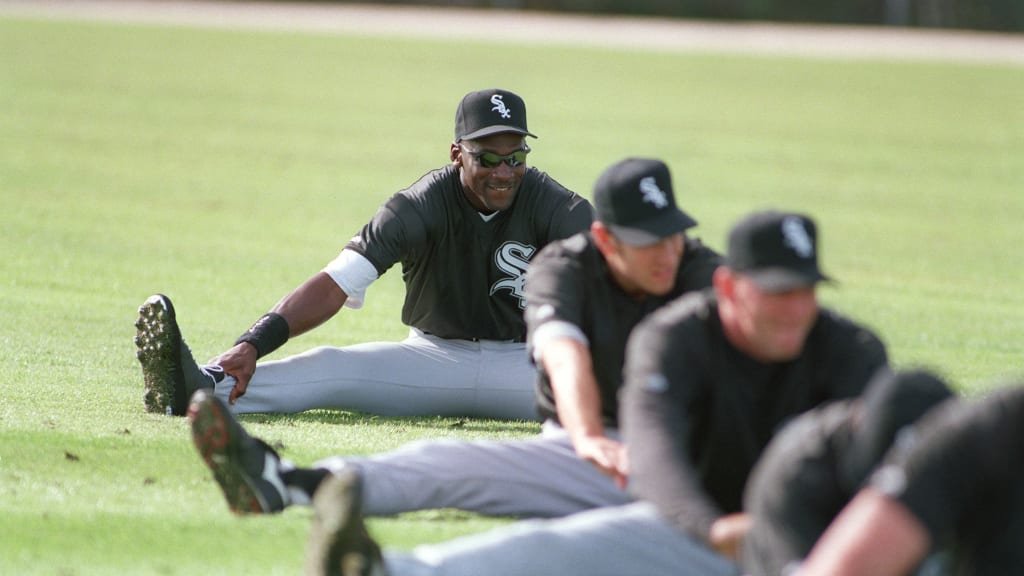Swapping Sneakers for Cleats: The Story of Michael Jordan’s Baseball Career
Michael Jordan. You may know him for his esteemed skill on the basketball court or his famous brand of basketball shoes – but did you know he had a brief career in baseball?
Prior to his shocking decision to leave the NBA in 1993, he had already established himself as one of the greatest basketball players of all time. Through his nine years so far in the league, his impressive resume included an NBA All-Star MVP, three season MVPs, and three-consecutive NBA championships for the Chicago Bulls from 1990-1993.
At the peak of his game and a spry 29 years old, his leaving the sport brought significant confusion to many. Although, the decision was not without good reason.
Michael Jordan #23 of the Chicago Bulls soars over the Houston Rockets, slamming a dunk at The Summit in Houston, Texas on January 30th, 1996. (Photo by Scott Cunningham/NBAE via Getty Images)
One of Jordan’s closest peers was his father, James Jordan. He was with Michael throughout his whole career and provided support throughout controversy. However, the summer of 1993 brought tragedy.
Beginning in July, James Jordan disappeared for several weeks. After investigations persisted, they found his red Lexus SC400 in a ditch with its windows broken. Upon further search – his lifeless body was discovered in a creek 60 miles away from the car.
This crushed Michael Jordan. He was already experiencing fatigue from his fame in the NBA, and this was the last straw. He announced he would leave the NBA on October 6th, 1993.
After the 1992 NBA Finals, Michael Jordan wraps his arm around his father James Jordan. (Photo by Sue Ogrocki/Reuters)
Growing up, Jordan played baseball as a teenager. He even considered pursuing it professionally before deciding the NBA was his path. But it was his father’s love of baseball that finally motivated Jordan to try out a different league.
In 1994, Jordan signed a minor league contract with the Chicago White Sox. Initially, he was assigned to the team's AA affiliate, the Birmingham Barons. He struggled to find his footing at the plate, batting just .202 in his first season.
Jordan doing practice swings with a weight around the bat. (Photo by John Swart/AP Photo)
His professional baseball debut was at the Hoover Met on April 8th, 1994 against the Chattanooga Lookouts. He sported the #45 like he did when playing high school baseball. That night, he drew a crowd of 10,359 and 130 media members. The stakes were high.
He went up to bat his first professional baseball swing. Contact was made, sending the ball into the air. As it approached the ground, Lookouts starter John Courtright patiently awaited its arrival.
That night he had gone 0-for-3 in a 10-3 loss to the Lookouts. A crowd that had high expectations from his basketball excellence went home disappointed.
The media crew documenting Michael Jordan’s every move at his first career baseball game. (Retrieved from the MLB)
There was criticism and praise for his performance. Sports Illustrated wrote a cover story called “Err Jordan.” The cover billing read, “Bag It, Michael: Jordan And The White Sox Are Embarrassing Baseball,” and the story mocked Jordan’s ability to swing while questioning the White Sox’s sanity.
This story lost Sports Illustrated all of Jordan’s respect and they never got a word from him again.
The cover of Sports Illustrated criticizing Michael Jordan for his decision to play professional baseball. (Photo by John Iacono/Retrieved from Jordans Daily)
Contrary to Sports Illustrated’s opinion, Jordan received praise from many for his numbers in the league.
The batting coach of the Barons, Mike Barnett, said that it is important to consider Jordan, “hadn’t played since high school, and he was holding his own in Double-A, which is filled with prospects. Two more seasons, he would’ve been a legitimate extra outfield for the White Sox, maybe even a starter.”
His natural athleticism and previous skill in baseball aided him greatly in jumping into the league, but it was his willing personality that helped him that allowed him to play so well.
At Wrigley Field in the Windy City Classic, Jordan is practicing his swings. He singled, doubles and drove in two runs, helping the White Sox achieve a 4-4, 10th inning tie with the rival Chicago Cubs. (Photo by Barry Jarvinen/AP Photo)
The head coach Terry Francona said Jordan, “had it all. Ability, aptitude, work ethic. He was always so respectful of what we were doing and considerate of his teammates.”
Emphasizing his work ethic, Barnett explained that, “Michael would go after it five times a day. In the cage before breakfast. Regular batting practice. Soft toss. Game BP. Then, after the game, he was back in the cage. His hand were blistered and bleeding, his intensity was off the charts.”
The gleaming Michael Jordan #45 and his teammates stretching on the field prior to playing baseball. (Photo retrieved from the MLB)
According to the MLB (Major League Baseball), in his first and only full season as a professional baseball player, “he hit .202, struck out 114 times, and committed 11 errors. He stole 30 bases and drove in 51 runs.”
However, the next season showed more promise. At the start of the season in the Arizona Fall League he was successfully batting .252, and this was against elite prospects. He had certainly improved, but his baseball career would end abruptly during the worst work stoppage in MLB history.
Michael Jordan #45 swinging at the baseball, making contact, and sending it flying. (Photo b Rob Tringali/SportsChrome/Newscom)
In the 1994-1995 season, owners’ attempted to create salary caps for the players. The players did not like this and went on strike midway through the season. This had many effects on the game.
For the first time in 90 years, The World Series was canceled. It affected the next season as well. The strike ended in March 1995, but it was too late. Michael Jordan quit the baseball scene.
Michael Jordan #45 on the bench looking toward the field during a game in 1994. (Photo by Focus on Sport/Getty Images)
Jordan based this decision on his experience in the NBA. He appreciated the integrity of the NBA’s unions. When the baseball league was summoning replacement players for those who were on strike, Jordan left. Two weeks later, he was back on the Chicago Bull’s lineup.
Michael Jordan’s short baseball career was not based on financial gain, but of passion. His agent David Falk said he, “gave up everything he had earned as the king of basketball to play Minor League baseball and subject himself to criticism. He put everything on the line to compete, with nothing to gain. That is the essence of sports.”
Jordan gained a lot from his experience. He revived his energy for basketball and continued to win three more consecutive championships with the Bulls. There were also relationships he gained along the way.
The team going for a flyball during a game, Michael Jordan #45 in the middle. (Photo by Focus on Sport/Getty Images)
Jordan’s passion for everything he did was clear, and his brief baseball career was a testament to that. Although he was not playing up to some standards, he still played professional baseball at a level most could never achieve.
His ambition was what made him one of the greatest of all time in basketball, and that same ambition led him to the baseball diamond. Walt Hriniak, a legendary Red Sox batting coach once said that, “if everybody was like M.J., the game would be better.”
